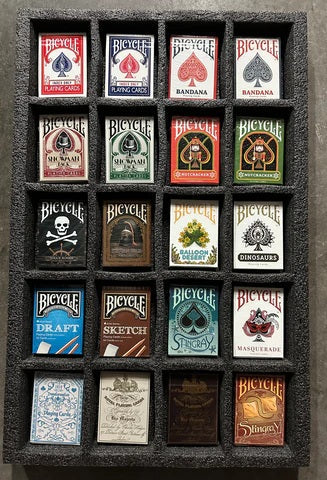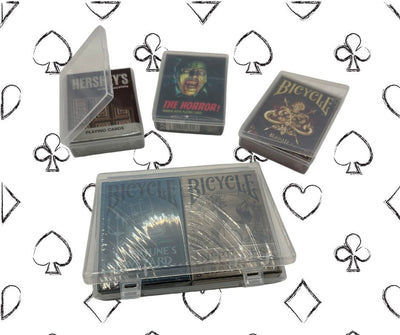When most people think of solitaire card games, they think of the classic game Klondike, which has become synonymous with solitaire itself. Klondike Solitaire is the quintessential example of a builder solitaire game, where you're trying to play all the cards from the deck from Ace through King on four foundations corresponding to suit, with the help of a tableau which is built with cards in descending order and in alternating colours.
Some of the finest solitaire games in the world are builder games like this, and take this concept in various different directions. But what about non-builder games, which employ playing cards in a totally different way? That's what this article is about. In previous articles I've already introduced you to some of the most well-known non-builder games like Golf and Pyramid, which represent pairing (or matching) games and adding games respectively. Alongside them are other non-builder solitaire games that work entirely differently again.
The goal of this article is to introduce you to some of the lesser known members of these families, and whet your appetite to explore and enjoy some of the many other non-builder solitaire card games that exist. There are games that use multiple decks, but they typically take longer to play and are more involved, so I've restricted this list to games played with a single deck. NB: To play these, I've used and recommend the excellent software from BVS Solitaire.
== Pairing Games ==
If you like Golf, you should try Black Hole
Overview: Black Hole is an adding and pairing game in the style of Golf, which is one of the most familiar solitaire games in the world, popularized especially by its variant Tri-Peaks, which was included in most personal computers with Windows. Black Hole was created by David Parlett, who acknowledges it was derived from Golf. The Ace of Spades starts in the center as the Black Hole, around which are placed 17 fans of 3 cards each. Ignoring suit, and only using the top card in each fan, the goal is to play all the cards into the Black Hole, with the next card always being one higher or lower in value than the previous one.
Thoughts: This is a brilliant game, and the majority of deals are solvable. Ideally you shouldn't change directions up and down within one game, or you'll quickly get stuck. Instead it's best to just build from Ace through King and then wrapping around back to Ace and repeating this process. Because all the cards are face up, with careful planning you can succeed more often than not. A related variant is Four Leaf Clovers, which makes the game harder by having a set-up of 13 fans of 4 cards each, but compensates for this by allowing you to build up or down one card at a time (ignoring suit) on the fans.
If you like Golf, you should try Eliminator
Thoughts: The beauty of this game is that you have open information from the beginning because you can see all the cards. By carefully planning ahead you should be able to win most games. Eliminator appears to be a simplified version of Striptease from card game guru David Parlett, which has only four foundations, and adds an extra twist by having four face-down cards that cover face-up queens at the top of each column. With only four foundations in Striptease, you're almost always at the mercy of the draw, making the chances of success extremely rare, which is why Eliminator is more satisfying. Ants is a related variant with four foundations, but instead of open information it deals out four cards at a time.
If you like Pairing Games, you should try Aces Square
Thoughts: This isn't an easy game to win, and the odds of success have been estimated as about 1 in 8. To have the best chance of winning, you shouldn't just select whatever pairs are available to discard, but try to keep track of how many of the six pairs in each suit remain. Then when you're down to the final one or two pairs, try to discard cards where a card from the stock will end up in a space that will enable you to pair with it.
If you like Pairing Games, you should try Doublets
Thoughts: Strictly speaking this is a variant of Nestor and its slightly more strategic sibling Vertical. But while those are open information games with all the cards face-up, the hidden information of Doublets is part of its charm. It's usually wise to try to work your way through all the tableau piles as evenly as possible, to prevent cards you need being trapped. By keeping track of the size of each pile, and the values that have and have not yet been paired, you can play the odds to increase your chances of winning, which is very achievable in most games.
== Adding Games ==
If you like Pyramid, you should try Giza
Thoughts: It's not hard to see why Pyramid is one of the most well-known solitaire games of all time, because it is easy to learn and play. For a long time Microsoft even included it in their solitaire suites on all Windows operating systems, alongside Klondike, Spider, FreeCell, and TriPeaks (a Golf variant). In Pyramid, however, you can frequently be thwarted by a poor deal. That's why Michael Keller came up with Giza, as a variant of the original that gives more opportunity for strategic play, since you have completely open information from the outset, and can plan more carefully.
If you like Adding Games, you should try Exit
Thoughts: In this game you have completely open information from the outset, so there is lots of scope for planning ahead carefully. A key element to keep in mind is to avoid any key cards becoming blocked. If you make good decisions about which cards to remove, you have a good chance of winning successfully. With Exit, David Parlett has created a wonderful game that is easy to learn and play, and yet requires a good amount of skill to complete..
If you like Adding games, you should try Fourteen Out
Thoughts: Some adding games come down largely to luck of the draw. But with Fourteen Out you have completely open information from the outset, and with 12 fans to work with, you can do a lot of planning as you play. You can see exactly which pairs still need to be combined in order to succeed, so it is especially important to free up critical pairs, and to prevent vital cards from being blocked. This is a game that involves more skill than luck, and you should be able to win over half of your games with good decision making.
If you like Adding Games, you should try Ninety One
Thoughts: This game is best enjoyed with the help of some software, so that you don't have to keep track of the running total yourself. One way to win is to have one card from Ace through King face-up, but this won't necessarily be the easiest way to achieve a total of 91, depending on the draw. It's surprisingly fun to play and easier than it first appears, especially if you're playing a digital version that takes care of the bookkeeping, and keeps updating the cumulative total for you.
== Other Games ==
If you like Accordion, you should try Royal Marriage
Thoughts: The feel of Royal Marriage is quite similar to Accordion, but the method of removing cards is slightly different, and you have much better chances of winning the game successfully. Instead of moving a card onto a card of matching value or suit, it's the cards in between them that are removed, so the matching cards remain in the line-up. I've found that a good strategy is to try to focus on using the Hearts to eliminate all the other cards, and where necessary using other cards that match to bring cards that are Hearts closer together. Whenever two Heart cards are only one or two apart, you can eliminate the cards in between, and once you have a line-up that consists only of Hearts, the game is basically won.
If you like Montana, you should try Maze
Thoughts: With Gaps and Montana the goal is considerably harder to achieve, because you only have four spaces instead of six, and the rules for movement are much more strict. With Maze you have lots of options for which cards to move and where, and with good decision-making you can win the game more often than not. The game is easy to learn and play, and yet it remains a game of skill where your decisions matter, without being so challenging that it is the kind of brain-burner like some of the other games in the Gaps family.
Hopefully this article will encourage you to check out some of the wonderful non-builder solitaire games that are just waiting for you to enjoy. Most people are already very familiar with builder games. While these have their appeal, it's with non-builder solitaire games that we get to step further off the path well-travelled, and explore other ways that playing cards can be used in new and interesting ways. The games covered here are among my favourites, but if you enjoy solitaire card games, then you should acquaint yourself with the classics of the genre that these are closely related to, and also check out the many other great non-builder solitaire games that exist.
Final note: You can certainly play these with an actual deck of playing cards, which is particularly satisfying with an attractive custom deck. But when it comes to learning the rules of a new solitaire game, the best way to play is with the help of a reliable software program, like the ones offered by BVS Solitaire. Their program for Windows is one of the best I've tried, and they also have excellent versions for Mac and for mobile devices.
About the writer: EndersGame is a well-known and respected reviewer of board games and playing cards. He loves card games, card magic, cardistry, and card collecting, and has reviewed several hundred boardgames and hundreds of different decks of playing cards. You can see a complete list of his game reviews here, and his playing card reviews here. He is considered an authority on playing cards and has written extensively about their design, history, and function, and has many contacts within the playing card and board game industries. You can view his previous articles about playing cards here. In his spare time he also volunteers with local youth to teach them the art of cardistry and card magic.





